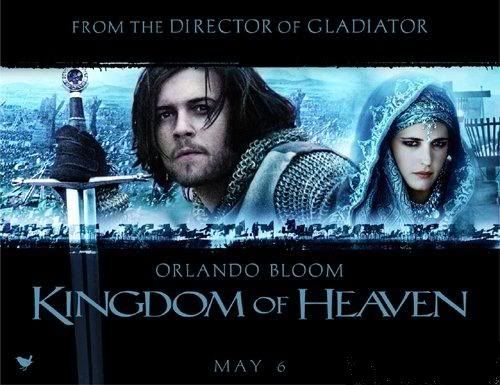
[audio:http://www.blueinkalchemy.com/uploads/kingdom.mp3]
A cynic is likely to look at the release of the Director’s Cut of a movie, scoff openly and accuse the studio or the director of trying to milk a few additional coins out of the movie regardless of its overall merit. And really, I can’t blame them. I like most sane people fear the prospect of an In The Name Of The King: Uwe Boll’s Vision Extended Edition hitting Wal*Mart shelves because John Q. Buynlarge will see Jason Statham on the cover and think it’s going to be Crank with swords and dragons. But this isn’t always the case. Sometimes, a little thing dubbed executive meddling takes a director’s vision for a film, carves it up from a delicious roast into processed lunch meat and passes it off to the unwashed masses. That’s what happened to Kingdom of Heaven. Having seen both versions, I can understand why Ridley Scott wanted to get his cut into our hands. It completely and totally changes the movie.

The plot is relatively unchanged. The year is 1184 and a young French man named Balian has recently lost his wife and child. A crusader appears at his smithy and claims to be Balian’s birth father, offering to take him to Jerusalem to leave his sorrow behind and find redemption for his sins. The journey is a perilous one, but Balian survives to become baron of Ibelin and a prominent member of Jerusalem’s nobility. An ill-advised war erupts between the Christians who hold the city and the Muslims under the command of Saladin, with Balian caught in the middle.
This being a Ridley Scott film, you can expect some liberties being taken with history and its figures. Some characters are composites of historical figures and some events turn out a bit differently than they actually did. However, this is definitely a different film from Gladiator in that Balian doesn’t challenge Saladin to single combat or anything like that. The events happen in the right order at the right time and are mostly unchanged despite the fictionalization. Also being a Ridley Scott film, there’s plenty of enjoyment for the eyeballs in terms of scenery, costuming and brutal swordplay. While Kingdom of Heaven follows the traditions of Gladiator and Black Hawk Down in humanizing grand events by giving us the point of view of a few key individuals, it breaks from Scott’s previous work in the message it’s delivering. And this message is etched into the bottom of the anvils dropped throughout the movie.

“Our God can kick their god’s ass!”
“Um… they’re the same god, sir…”
“Blasphemy! Our God will prevail! GOD WILLS IT!”
*facepalm*
The protagonists who are pious have a significantly modern and humanistic stance on their faith while the bad guys mostly use religion as an excuse to wage war and earn booty. The rallying cry of “GOD WILLS IT!” is used on both sides of the conflict. Clearly, there’s a lesson on tolerance to be learned here, one that works quite well on the individual level but is harder to spread to a large group. There’s a scene towards the end where Saladin, entering a temple to pray, comes across a golden crucifix that was knocked the ground. He very carefully and respectfully picks it up and puts it back where it belongs. From what I understand, this scene was met with cheers and applause in Middle Eastern theaters. So much for all Muslims hating the West.
As much truth as there is in the actions and events we see, the movie isn’t perfect. It runs longer than Gladiator, especially in the Director’s Cut, but you might not necessarily notice… I’ll come back to that. Balian can come off at times as something of a Mary Sue, being that he’s a blacksmith and a swordsman and a seige-crafter and a man of virtue and looks like Orlando Bloom. That doesn’t make the mass knighting in Jerusalem (another real-life event) any less awesome. Speaking of which, some history buffs may not be able to accept the depiction of events, or the lack of detail given on one of the biggest battles of the Crusades. These are minor flaws, in my opinion, and they apply to both the theatrical release and the Director’s Cut of the movie.

Admit it. You wish Liam Neeson was your dad, too.
The original release, which I saw a few years ago, felt disjointed and badly paced. While we get a great deal of detail on Balian, his father, Saladin, Guy de Lusignan and King Baldwin IV (Edward Norton behind a very stylish mask),one of the key players, Sibylla, is given very little screen time and characterization. It’s like she’s introduced, gets into Balian’s life and then is swept aside in favor of fluttering banners and the siege of Jerusalem. Her role in the events that unfold in the Holy Land is rendered nearly to non-existence. I never thought it was bad, per se, but I definitely ranked it below Gladiator.
In the Director’s Cut, Sibylla’s role is expanded and deepened, and her son, which wasn’t even mentioned in the theatrical release, also has a pretty significant part to play in the plot. Balian feels a bit more real and less of a Mary Sue, there’s some good payoff in his relationship with Guy, and everything I liked about my first viewing – the scenery, the shot composition, the brutal realistic fights and the message of tolerance in the face of a holy war – remained intact, if it wasn’t enhanced. This is no cash-grab. This is no pandering re-release. This is an entirely different movie, and it’s one of Ridley Scott’s best. Put the Director’s Cut of Kingdom of Heaven on your Netflix queue for any one of the following reasons: It’s a period drama, a tale of adventure, an interesting romance and climaxes in a battle that feels taken right out of the Pelennor Fields in Return of the King. It feels shorter than its three hour running time and it’s worth every minute.
Except for that Overture and Entr’acte bits at the beginning of each disk. I really didn’t like the idea of Saladin suddenly breaking into song.
Josh Loomis can’t always make it to the local megaplex, and thus must turn to alternative forms of cinematic entertainment. There might not be overpriced soda pop & over-buttered popcorn, and it’s unclear if this week’s film came in the mail or was delivered via the dark & mysterious tubes of the Internet. Only one thing is certain… IT CAME FROM NETFLIX.


